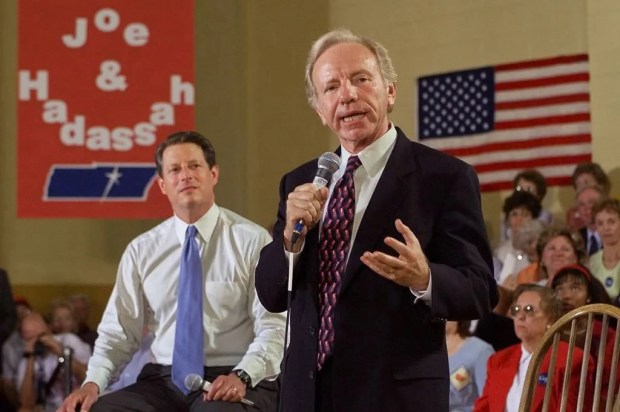The paradox of Joe Biden is well known. How does the experienced, effective, formidable politician turn into such a fiasco-stalked jellyfish every time he goes for the presidency?
Given his advanced state of decomposition, there has been something almost moving about watching Biden being wheeled around another campaign this year. Every Biden event, every meet ’n’ greet, every New Hampshire stroll has generated a micro-gaffe or viral mini-controversy. And each word, each gesture is combed for evidence of sexism or racism.
Biden’s most laudable, nay, heroic effort so far to live up to this reputation came during the third debate in Houston. Asked a spiky question about reparations, he replied, with the unstoppable logorrhea of an elderly dowager aunt:
‘Well, they have to deal with the – look, there’s institutional segregation in this country. And from the time I got involved I started dealing with that. Redlining, banks, making sure that we are in a position where – look, talk about education…we have one school psychologist for every 1,500 kids in America today. It’s crazy. The teacher are a– I’m married to a teacher; my deceased wife is a teacher. They have every problem coming to them…we bring social workers into homes and parents to help them deal with how to raise their children. It’s not that they don’t want to help. They don’t know quite what to do. Play the radio. Make sure the television – excuse me, make sure you have the record player on at night. Make sure kids hear words. A kid coming from a very school – a very poor background – will hear four million fewer words by the time they get there.’
Waiting for this answer to stop was like watching a clock hand on a particularly hot and listless afternoon. Would the hand ever move? Would the afternoon ever end? It was classic Biden.
But this year he is not, for once, running against his own gaffes. He is running against the internet. Or to put it differently: the Biden campaign, which sees itself as representing sensible offline Democrats, is running into a barrage of artillery fire from wacko, extremely online Democrats.
The issue is not his age (though Biden does seem incredibly ancient, like Brezhnev without the medals), it is whether a candidate can still compete electorally without significant online backing. Biden has no tastemakers, no meme-generators, and no podcast hosts to give him air support.
His campaign staff are aware of this and bristle when it’s pointed out. According to Politico they dislike that Biden is followed around by a young, liberal press corps that is ‘highly attuned to modern issues around race and gender and social justice.’
A senior Biden adviser pointed out that Joe doesn’t need to run for president of Twitter: ‘The party is older than people think. It’s more centrist than people think…actually he is most in step with the party. But no one ever sees it that way because that is not the world as seen through Twitter.’
This echoed Jonathan Chait’s warning against ‘treating the consensus on progressive Twitter as though it were a simulacrum of the real Democratic party.’ Chait’s concerns tie into a larger argument, made all the time in the press. It can be summarized in one sentence: Twitter is not real life.
A few years ago I found myself in Canberra, the capital of Australia. With a few hours to spare in this odd city, I walked up the hill where the parliament sits, looking uncomfortably like a sculpture outside an airport terminal. Despite wearing what might be described (charitably) as beach clothes I was given a warm welcome into the building. As I padded around the halls of this great democracy in my flip-flops one banality struck me with thunderous force.
Everybody was on their phone, scrolling.
Inside the air conditioned chambers, along the lacquered wooden corridors, everybody was on their phone, scrolling. The prime minister stood up and made a statement about taxes. He sat down and examined his phone. The leader of the opposition, the members of parliament, the senators, the receptionist, the security dudes weighed down with gunmetal, the political advisers, the cleaners (probably); everybody was on their phones, scrolling.
What was really so important on the internet that day that Australia’s parliamentarians could not concentrate on each others’ speeches for more than 10 seconds at a time? The solemn, weighty duties of representative democracy clearly pale in comparison with searching for your own name on Twitter.
Was none of this ‘real’ life? What makes Twitter less ‘real’ than, say, a watermelon, or a chair? Our political and media classes, like Australia’s MPs, like most people – whether they live in Chongqing or Mombassa – spend plenty of time online. Telling them that this isn’t ‘real’ is the equivalent of some half-literate cobbler telling Martin Luther that his Ninety-five Theses are not real, not because of their content, but because he had them printed.
It is hard to imagine a Donald Trump presidency without Twitter. All kinds of creepy social phenomena – like the ‘white supremacy culture’ training given to New York school administrators – appear baffling unless you have watched these ideas flow out of Twitter into ‘real’ life.
The late John Lukacs once argued that social change is not the result of material conditions but a result of ‘the accumulation of opinions’. Ideas, organized and ruthlessly disseminated are what really change the world. ‘And such accumulation can be promoted, and for some time even produced, confected for the majority by hard small minorities.’
There is a small hard minority in the Democratic party that would rather swim in the local bog than see Uncle Joe nominated. The ideas they’re confecting are part of a renaissance of leftist thought that are revising the politics of the young in Britain and France too.
Perhaps these people are not real; perhaps Joe Biden is. But if you want to know who is on the wrong side of history, ask yourself this. In a decade will the Democratic party look like Joe Biden, or will it resemble Alexandria Ocasio-Cortez?
See the full story of Joe Biden versus the internet on Spectator USA.
Got something to add? Join the discussion and comment below.
Get 10 issues for just $10
Subscribe to The Spectator Australia today for the next 10 magazine issues, plus full online access, for just $10.





















Comments
Don't miss out
Join the conversation with other Spectator Australia readers. Subscribe to leave a comment.
SUBSCRIBEAlready a subscriber? Log in